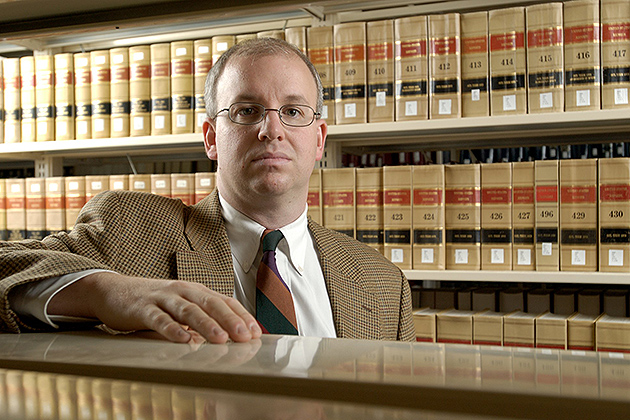
This week has been one of the most significant in recent memory for the U.S. Supreme Court, which issued rulings on major cases that touched on affirmative action, voting rights, and gay marriage. UConn political science professor David Yalof, an expert on constitutional law and judicial politics quoted widely in the media, offers an early take on what the court did and what it means.
Affirmative Action
The case Fisher v. University of Texas challenged the use of race as a factor in college admissions. Prior to the court’s ruling on Monday, many observers said affirmative action could be significantly affected by the justices’ decision. Instead, though, the justices sent the case back to a lower court for review, as Yalof explains.
“In essence, the court sent the case back because they believed the lower court had failed to apply strict scrutiny to the policy in the way they were supposed to. In a 2003 case called Grutter v. Bollinger, the Supreme Court ruled that a higher education institution could take race into account in the admissions process, so long as it was narrowly tailored to meet the compelling state interest of having a diverse educational environment. In this case, they just believed the lower court had failed to apply that ‘narrowly tailored’ standard in reviewing the University of Texas’ policy.
“We could see this case, and many people predict we will see this case again, in a few years, based on what the lower court does. The complicating factor is that there’s a case the Supreme Court has accepted for next year which has to do with an amendment to the Michigan constitution that effectively prohibits affirmative action. We may get a decision on that that renders everything else moot and void.”
Voting Rights Act
Ruling 5-4 in the case Shelby County v. Holder, the court invalidated a portion of the landmark 1965 legislation that had required nine states, mostly in the South, to get Justice Department approval before making any changes to election or voting laws. The decision is a hugely significant one, Yalof says:
“This is probably the most momentous decision on the Voting Rights Act since it was passed in 1965. This section of the act applied to a number of states with a long history of discrimination against African Americans exercising their voting rights. What the Supreme Court basically said is that they’re no longer to be treated any differently from any other state – that the time has passed when we need to do this.
“It’s interesting because I think most sides agree that this specific provision of the Voting Rights Act – which, by the way, was reauthorized overwhelmingly by Congress in 2006 – has been a very successful and effective portion of the law.
“Now these states will no longer have to get federal approval for redistricting or other changes, unless Congress does what the court recommends and comes up with new criteria for which states should have to undergo this additional approval. The problem there is that Congress has been having trouble finding a cohesive approach to almost anything lately, so that kind of legislation seems very unlikely.”
Defense of Marriage Act
Signed into law by President Bill Clinton in 1996, this act barred same-sex couples from receiving federal spousal benefits like tax exemptions and Social Security survivors’ payments, regardless of whether they had been legally married in a state. The court ruled 5-4 that the act, known as DOMA, is an unconstitutional infringement on personal liberty protected by the Fifth Amendment. As Yalof explains, this is a major victory for supporters of gay marriage:
“It’s an important decision for gay marriage, because gay marriage supporters have been winning at the state level, increasing the number of states where same-sex marriage is legal. If that kind of federal law undermined or gutted those victories by saying, ‘Well, yes, you’re married, but since you’re a same-sex couple, you still don’t enjoy these types of benefits,’ that would represent a significant problem for them.
“Having that law threatening the gains at the state level was considered very negative, even though the current Justice Department is not enforcing DOMA. They were more worried about what future administrations might do. Now, with this ruling, if a same-sex couple is legally married in any state, they’re entitled to the same federal benefits that an opposite-sex couple gets. That’s a major substantive victory for gay marriage supporters.”
Proposition 8
A ballot initiative that amended California’s constitution to prohibit gay marriage, a lower federal court struck down Proposition 8 as unconstitutional. The Supreme Court ruled not on the question of gay marriage, but that the plaintiffs challenging the lower court ruling didn’t have legal standing to make their case. It’s a complex decision, but overall a win for gay marriage supporters, Yalof says:
“When the lower court declared that Prop. 8 is unconstitutional, the question is, who sues? You’re now suing to declare something constitutional that’s been declared unconstitutional, a ruling the California state government did not contest. The Supreme Court ruled that private individuals do not have standing to file that lawsuit, because they’re not affected by it more than anyone else.
“So while it’s a decision about procedure, the court is in effect giving a huge victory to supporters of same-sex marriage, because now it’s legal in California and the lower court’s decision hasn’t been overturned. The lower court ruling doesn’t necessarily affect other states that have constitutional amendments banning gay marriage, but it can be used on an informational and even persuasive basis by other courts.
“The court didn’t rule that gay marriage is a constitutional right in all 50 states, which they could have done. But supporters of gay marriage get a lot of positive legal language from this case, although DOMA is a clearer victory on the merits, no question about that.”


